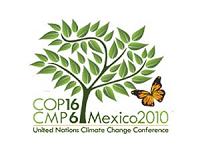| . |  |
. |
Cancun, Mexico (AFP) Dec 6, 2010 Climate negotiators hailed a brighter mood as global talks enter the home stretch on Tuesday, with China voicing flexibility on issues of global cooperation that have dogged past sessions. But the meeting at the Mexican resort of Cancun looked set to kick along some of the most divisive issues to future meetings -- most crucially, by how much countries will cut carbon emissions blamed for global warming. Top negotiators from more than 190 countries launch on Tuesday the main phase of the two-week meeting, which comes a year after the much-criticized Copenhagen summit that produced a general agreement to work together. China appeared to tone down its adamant past refusal at being part of a binding agreement that would include outside verification that it is making good on its pledges to curb emissions. "China is willing to share with the world and we have a willingness to take an open and transparent attitude," Chinese negotiator Xie Zhenhua said. "There is more consensus and our differences are being reduced," he said of the meeting. "At the end, there will maybe not be a satisfactory deal for everyone but an acceptable one." With China now the world's top polluter, the United States considers tough, binding and verifiable commitments by the Asian giant to be the best way to sell any climate agreement in Washington. But last month's election victory by the Republican Party, which includes skeptics of the science behind climate change, all but ended the prospect of the United States approving legislation to restrict carbon emissions. On a brief visit to Cancun, US Energy Secretary Steven Chu said President Barack Obama was committed to meeting US pledges made in Copenhagen to curb carbon emissions by 17 percent by 2020 from 2005 levels. "He absolutely feels that moving toward a clean energy economy is really about our energy security and about our financial security," Chu said about the president. "It's about our economy; it's about the future of the planet." Chu's low-key visit, which included a PowerPoint demonstration at the beachfront conference, contrasts with the major push last year at Copenhagen, where Obama and other leaders personally hammered out the final deal. Even if major emitters meet their stated goals, scientists say it is not enough to achieve Copenhagen's ambition of checking global warming at two degrees Celsius above pre-industrial levels. The Cancun conference is considering strengthening the target to 1.5 degrees as scientists warn that climate change is already wreaking havoc, with rising sea levels on course to threaten low-lying cities around the world. Wendel Trio of environmental group Greenpeace likened Cancun to "a meeting of Emitters Anonymous." "We want countries to recognize that there is a problem and that their figures are not going to help us deal with climate change," he said. With few expecting a full-fledged treaty anytime soon, the European Union has led calls to extend the Kyoto Protocol past the end of 2012, when requirements under the landmark treaty are set to expire. The EU position has triggered protests from Japan. It says Kyoto is unfair by not involving the two top polluters -- China, which has no requirements as a developing country, and the United States, which rejected the treaty in 2001. Hoping to break the deadlock, host Mexico paired up developing and developed nations to sort out differences. Britain and Brazil were tasked with looking into the future of the Kyoto Protocol. Brazil's negotiator, Sergio Serra, feared that Japan's firm position would "have a strong, negative impact on everything that can be negotiated here at the conference." He hoped to reach a solution under which "if Japan can't completely change its position, at least it cannot be an obstacle to the conference's end result." Outside the conference, Mexican authorities were stepping up security as busloads of activists and peasants plan to protest Tuesday against proposals to put the World Bank or markets in charge of climate assistance. "What we're hoping to achieve is to influence the process. So far it's business as usual -- they're trying to make better business," said Paul Nicholson of farm workers activist movement Via Campesina.
Share This Article With Planet Earth
Related Links Climate Science News - Modeling, Mitigation Adaptation
 WikiLeaks adds twist to climate hopes
WikiLeaks adds twist to climate hopesCancun, Mexico (AFP) Dec 6, 2010 Climate negotiators Monday hailed a brighter mood in often torturous global talks, but disclosures by WikiLeaks of hard-nosed behind-the-scenes diplomacy threatened to reopen fissures. A two-week session in the Mexican resort of Cancun is looking to make incremental progress toward a new treaty to fight climate change, which UN scientists warn threatens severe effects for the planet if unche ... read more |
|
| The content herein, unless otherwise known to be public domain, are Copyright 1995-2010 - SpaceDaily. AFP and UPI Wire Stories are copyright Agence France-Presse and United Press International. ESA Portal Reports are copyright European Space Agency. All NASA sourced material is public domain. Additional copyrights may apply in whole or part to other bona fide parties. Advertising does not imply endorsement,agreement or approval of any opinions, statements or information provided by SpaceDaily on any Web page published or hosted by SpaceDaily. Privacy Statement |